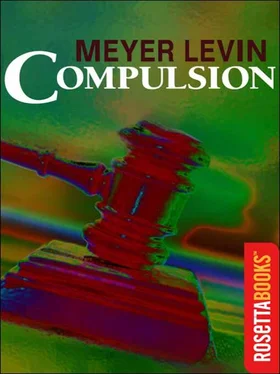“Yes, one’s thinking, feeling, and actions, in relation to the situations in which one is being placed and that one can recall.”
“And what is emotion?”
“Emotion comes from the need of living matter to maintain itself.”
“Then a person, an ‘I’, a mind, is badly served by an emotional nature that does not seek to maintain itself?”
“In what way?”
“Someone who committed rash acts that could lead to death – would he be emotionally defective?”
If he was referring to suicides, Dr. Tierney said, it would again be a case where the definition of mental illness came with the act itself.
“But there are indirect forms of suicide?”
Not every rash action was evidence of a self-destructive impulse, the doctor said. Some rash actions were merely foolish.
Wilk nodded. Wasn’t a self-destructive or suicidal tendency often found in a split personality? That is, one part for, one part against, oneself?
Yes, Dr. Tierney agreed.
“Now what was the word again? Sizzo – never mind. If you did find a split personality, you would examine further, wouldn’t you?”
Dr. Tierney smiled. “It is all a question of degree. If you forget a word, Mr. Wilk, I shouldn’t think it necessary to examine you for mental disease.”
Wilk awarded him a mock bow. “Now – this schizo – what sort of persons are most liable to it?”
“Why, schizophrenic persons, naturally.”
“Are you trying to evade me or make fun of me?”
“No, I’m trying to understand you,” the doctor said urbanely.
“At what age is it most likely to develop into a psychosis?”
“What do you mean by it ?”
“I mean your sizzyphasis or whatever it is.”
The doctor’s face became stonily remote. So he had been put off guard by clowning. “I can’t generalize,” he said.
Ah? Wilk glanced into the doctor’s own book, at the page where his finger had been all the while. “During the period of adolescence?”
“A certain frequency has been noted,” the doctor admitted.
Wilk read from the book, “‘In such cases – schizophrenia in adolescence’” – and this time he had no difficulty whatsoever with the word – “‘one often finds expression in crimes of violence.’”
Horn shouted, “This has no bearing on this case, has it, doctor?”
“Wait till it’s your turn to ask questions!” Wilk snapped before the judge could intervene. And he returned to his attack.
“When is this condition most often seen?” Wilk persisted.
Tierney sat silent. Wilk read, “‘This condition may most often be seen in adolescents at the time when they are emancipated from home control, and when they are leaving school…’”
The doctor shrugged.
Wilk read on. “‘It may occur in persons of a high degree of intelligence… At this difficult stage toward the end of puberty, the subject may develop fantasies, bordering upon autism. However, not all such cases develop a psychosis.’” He raised his eyes from the book and asked, “Would a young man of exceptional intelligence who had had a governess until the age of fifteen, who left home at that time, leaving one school for another, a young man decidedly given to fantasies – would such a person come under this description?”
It was some years, Tierney said, since he had written this book.
“Do you intend to take this out in the next edition?” Dr. Tierney responded to the laughter with a stiffly sporting gesture of the hand. Wilk read on. “‘The subject may go so far as to commit murder, seemingly for no motive, and he may appear devoid of remorse.’”
“Doctor, did you find any evidence in either of these subjects of a paranoid personality?”
He had noted in Judd Steiner a few superficial similarities, Dr. Tierney said. “But the main features of a paranoid personality are lacking.”
“What would such features be?”
“Selfishness and a domineering character are often noted.”
“Such as one might attribute to a superman?”
Dr. Tierney smiled. “That is entirely a concept. However, even this concept concerns a more developed paranoid stage.”
And could Dr. Tierney recall any other features of a paranoid personality?
There was a guarded silence. “I will help you,” Wilk said, looking again in the book. “‘One who is anxious to be in the forefront’?”
“Yes, but that might be considered part of an egocentric character.”
“Well, let us see about egocentrics.” Wilk thumbed the volume. “Doesn’t it say somewhere here that an egocentric is practically the same thing as a paranoid character?”
The doctor’s lips parted in a thin smile. “I don’t think I will quarrel with you very much on that.”
“Then why not say yes, and agree with me once, without so much work?”
Someone applauded. The gavel rapped. He returned to his point. Were people with this egocentric or paranoid character usually fond of learning?
This was often a characteristic, the doctor admitted.
“‘While they learn readily, there is really no broad grasp of the relationship of the material learned to the situations in life.’ Is that right?”
Dr. Tierney hedged. Only of certain types of paranoid or egocentric personalities.
“All right, doctor. You still recognize this book as an authority, do you?”
Tierney nodded stonily.
“I am reading from page 157. The heading of this section is ‘The Egocentric Personality’. It says: ‘Individuals of this type are often endowed with a facility for learning in a parrot-like way, which enables them to acquire their lessons easily and to do well scholastically, but the quality of the learning is poor, and there is really no broad grasp of the relation of the material learned to the situation in life.’”
“That’s right, as I already agreed.”
But was not this the defence description of Judd, an egocentric or paranoid type of a psychopathic personality? “And I understand you to say that a psychopathic personality is not yet in a diseased condition?”
No, not necessarily.
“But it would put a doctor on his guard to investigate?”
“If one knows one is dealing with a paranoid personality, I don’t see anything further to investigate. I know a lot of paranoid personalities in ordinary society.”
“If that paranoid personality has committed a crime, a murder?”
“Oh, in that case the personality should be investigated.”
Time and again in the trial, it seemed to us, this point had been reached. Yet we hung on the words, as if, this once, the answer might appear.
As Wilk put the question, the scientists of the mind could read the meanings afterward – why couldn’t they read them before a crime?
Because a psychopathic personality was not mentally diseased, the doctor insisted. There was as yet no proof that he would be harmful to others or to himself. He might be on the way to disease or he might be adjusted as he was.
“It just happens, does it?”
The number of psychopathic personalities, fortunately, was not very great, Dr. Tierney said.
“Not so great but that – since you show us they are recognizable – we could watch them with more care,” Wilk said, turning and looking steadily at Judd. He had put the pieces perfectly into place; he had made the State’s alienist confirm, to the precise point, the defence contention that the boy was not insane, but that he showed marked characteristics of a potential disturbance.
Wilk went back to his table. Astonished, we realized that the case was nearly over. For a month, we had come to this room as to a class. In the last weeks, we had learned a great deal about psychiatry. Only, what were the true opinions of the doctors? And even between Wilk and Horn, how much was conviction? If Horn himself were an attorney outside the services of the State, would he not be willing to defend the same boys?
Читать дальше












